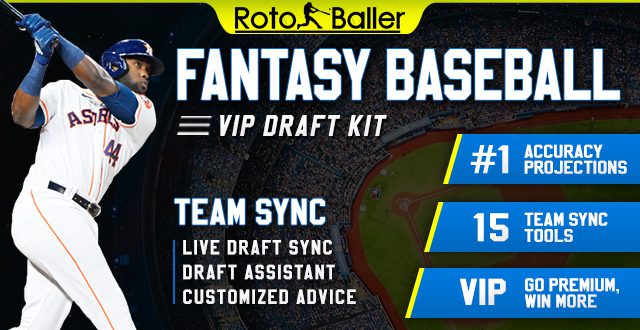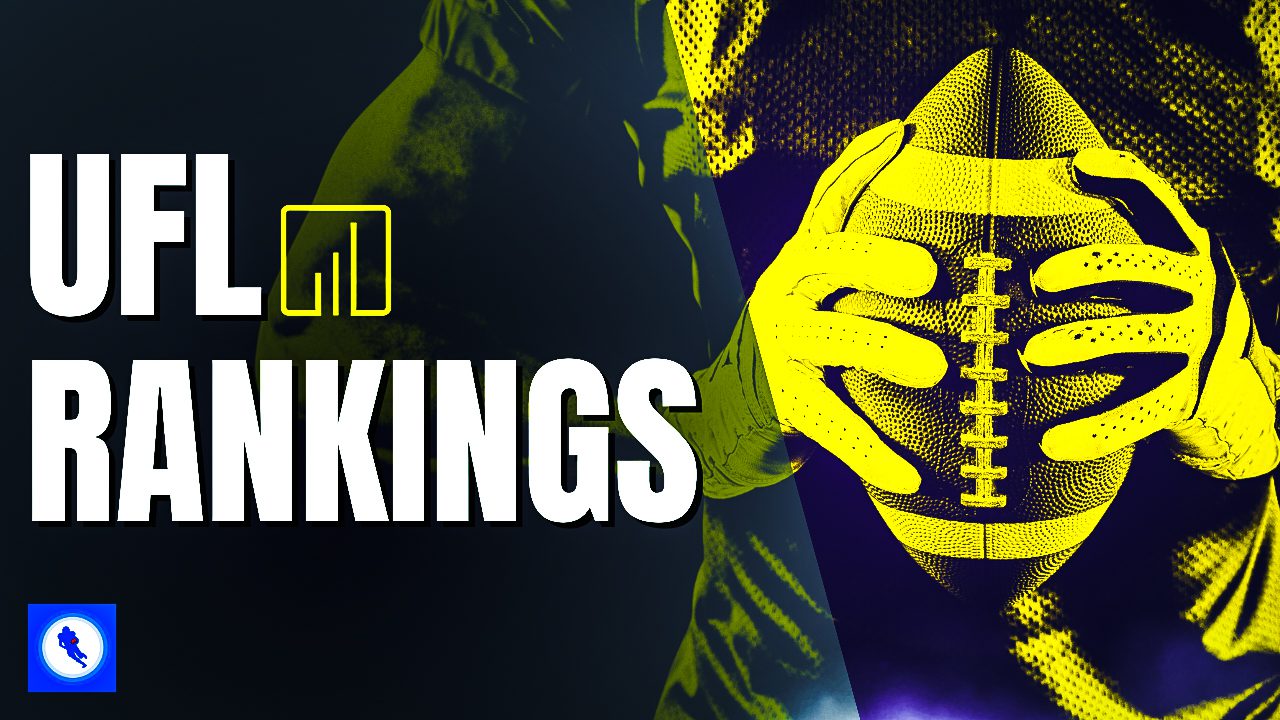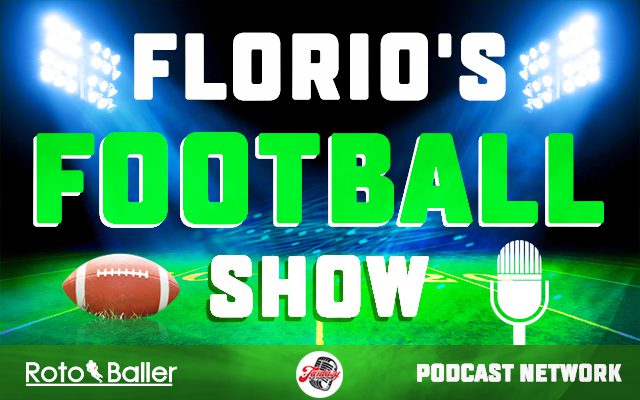Eric Samulski identifies hitters at each position that are high-floor offensive players with consistent track records to help fantasy baseball owners through the shortened 2020 MLB season.
Chaos is the name of the game when it comes to the 2020 Major League Baseball season. We've got a short season, a limited schedule, expanded rosters, universal DH, and the continuously looming threat of a global pandemic. In other words, we have a plethora of factors we've never had to deal with before as fantasy managers (and, really, people).
Some of those unknowns can be exhilarating (clearly, not the pandemic. Players' safety should always be taken seriously). Yet, in terms of changes to the game itself, we get to take more chances on players who are usual bit by the injury bug, can get to see a creative shift in bullpen usage, or can roster more of those NL power hitters who we used to wish were traded to a team with a DH. All of that can be fun. However, it's also coated in risk. We simply don't know how any of these new strategies and playing time decisions will pan out, which is why it's important to balance out the risk and chaos of this unique season with something that you can rely on.
Meet your Fantasy Life Vests. I've highlighted players at each position who have proven themselves to be consistently reliable over the years. Obviously, there are more, but these are a few of my personal favorites and guys I'm trying to get on my teams this year. My recommendation is to keep these names in your back pocket and try to slide two or three onto your roster to balance out the risk factors you're likely to have at other positions. NOTE: All ADP information is taken from NFBC Online Sprint Championships from June 29 to July 20
Be sure to check all of our fantasy baseball lineup tools and resources:- Fantasy baseball trade analyzer
- BvP matchups data (Batter vs. Pitcher)
- PvB matchups data (Pitcher vs. Batter)
- Who should I start? Fantasy baseball comparisons
- Daily MLB starting lineups
- Fantasy baseball closer depth charts
- Fantasy Baseball live scoreboard
- Fantasy baseball injury reports
First Base
Freddie Freeman, Atlanta Braves (ADP: 25)
Freddie Freeman returned from his bout with COVID-19 and seems ready to go back to his reliable ways. In his own words, he had four miserable days but now feels strong, has lost only one pound, and has been getting five to six at-bats in each intrasquad since he's been back. That's good news for you since the 1B position is rife with question marks about Pete Alonso's batting average, Anthony Rizzo's back, Rhys Hoskins' swing change, Josh Bell's first and second half splits, and Paul Goldschmidt's lack of steals. Amidst those question marks, Freeman's Statcast page since 2015 has remained remarkably consistent:

Not only is there a beautiful amount of red, but there are very few peaks or valleys. It's part of the reason Freeman has been a .275 or better hitter since 2013 and has had 20+ HRs in every year but two in his entire career. Yes, we should believe in last year's power breakout, but we should also believe in his consistency. If people are worried about his health, take advantage and secure Freeman to avoid the 1B headaches that may otherwise ensue.
Carlos Santana, Cleveland Indians (ADP: 145)
If you miss out on Cody Bellinger or Freeman at the top of the draft, it may not be a bad idea to wait on a first baseman. Besides my personal choice (Rhys Hoskins), the next two guys provide some consistency and stability at the position over their long careers. Santana in particular impresses me with the consistency of his performance, even down to the BB% and K%, which have experienced few impactful rises and falls over his decade-long career. You can bank on a 14% BB% or higher and a K% below 20%. That has led to reliable run and RBI totals in every season due to his contact profile and position in the middle of the order.

Even if Santana's power doesn't match last year's pace, and I don't believe it will, he should still contribute in the category while also being a strong source of runs, RBI, and average. If you're in an OBP or OPS league, then it doesn't really get more consistent than Carlos. Since I already covered in another post that the Indians have the second-easiest schedule in baseball during the short season, that's just another feather in his cap.
Edwin Encarnacion, Chicago White Sox (ADP: 162)
Nelson Cruz gets all the publicity for continuing to defy age, and rightfully so, but Edwin Encarnacion isn't too far behind. The 37-year-old has been a force in the middle of batting orders since 2006, and the only knock on him in drafts this year was whether or not his age would finally catch up to him. I don't see that being likely in a 60-game season, which means E5 is exactly the type of consistent hitter you need in your lineup.
He's had at least 32 HR in every season since 2012 and knocked in over 100 runs in all but two of those seasons (one he was injured for a few weeks, and the other he finished with 98). He's had a double-digit BB% in all of those seasons and, while he's seen his batting average drop a bit the last two years, has never hit below .244 over that span. He seems like a locked-in .245, 35 HR, 100 RBI, 85 runs over a full season or .245, 13 HR, 37 RBI, 31 runs in the shortened season. That's valuable on any roster.
Second Base
Jose Altuve, Houston Astros (ADP: 38)
Jose Altuve doesn't run as much anymore so people seem to be jumping off the bandwagon in favor of Ozzie Albies or Keston Hiura. Then there's the cheating scandal, which has only seemed to dampen his value. However, if you look at the top 2B coming off the boards (including Gleyber Torres, Ketel Marte, and Jonathan Villar), Altuve is really the only one with a consistent track record.
Over the last five years, he's basically been locked into a .300 average (hit .298 last year), with 15 HR, 85+ runs, and 70+ RBI. He's never had a K% above 15%, his launch angle has been within 1.5-degrees, and his exit velocity has stayed within 1.2 mph each season. He may not be as sexy of an option without the stolen bases, but if you're looking for consistency at 2B, Altuve is your guy. Bank the batting average and runs and know that he'll chip in value in the other categories too.
Third Base
Kris Bryant, Chicago Cubs (ADP: 59)
It seems like every season we're "over" Kris Bryant for some reason, but every season he keeps producing.

With the exception of the injury-plagued 2018 season, Bryant has given a relatively consistent baseline of production. He's going to give you around a .275 average, 30 HR, 100 runs, and 75+ RBI. His K% has been steady since his rookie reason, and everything from the wOBA to wRC+ is pretty much in line every season. If you miss out on those first and second round 3B targets, Bryant is a pretty solid consolation prize in a year full of question marks. The fact he is seeing time at first base in intrasquad games makes him even more interesting, especially at the leadoff spot.
Manny Machado, San Diego Padres (ADP: 68)
Oh, look, another guy we've unfairly maligned. The move to San Diego was supposed to torpedo Machado's value, but he came through with another solid season. Yes, he's no longer a top-four round pick outside of Camden Yards, but he remains a steady contributor. His batting average took a hit in Petco Park, but he still hit 32+ HRs for the fifth-straight year and he's scored 81+ runs and knocked in 85+ over that span. The power performance is supported by consistent Statcast metrics in Exit Velocity, Launch Angle, and Sweet Spot %.

Even if Machado is now more of a .270 hitter than a .300 hitter, he should still be locked into a 30/80/85 season, which would be 11/30/32 over 60 games. That would make him a top-50 hitter as a baseline.
Shortstop
Marcus Semien, Oakland A's (ADP: 100)
Most of the talk around Marcus Semien has been about his improved defense and power outburst last season. However, while the spike in power was great, Semien has been consistently productive since 2015. He's been giving fantasy owners a baseline of 15 HRs and 10 SBs with 70+ Runs and RBI for four years before taking the step forward last year. While those numbers, paired with a .250 average, certainly pale in comparison to the .285, 33 HR, 92 RBI, 123 R, 10 SB line he put up last year, they show that Semien has never "busted." He has always provided a solid floor, and now that there is a tantalizing ceiling to go along with it, Semien is a great choice for a safe shortstop option, especially with the Athletics' park factors schedule playing to his strengths.
Didi Gregorius, Philadelphia Phillies (ADP: 235)
If you choose to wait on shortstop or need a late MIF option, Gregorious has proven himself to be a fairly stable fantasy player over the last four seasons. With the exception of last year's injury-shortened season, Gregorious has been a lock for 20 HR, 70+ Runs and RBI, and a .265 average. Playing hurt last year likely contributed to his drop in BABIP and average, but the power production was still there, thanks to a career-high barrel % and exit velocity. Now healthy and hitting in the middle of a talent Phillies lineup, there is no reason not to expect similar power metrics from the veteran with a return to a .265 average, which makes him a great option as a stable late-round pick to balance the risk factors usually being picked around that time.
Outfield / Designated Hitter
J.D. Martinez, Boston Red Sox (ADP: 23)
Hitters don't get much more "professional" and consistent than J.D. Martinez. Since he was set free from Houston and established himself as one of the league's elite hitters, he has also remained one of the most reliable. He's hit over .300 in five of the last six years and has at least 36 home runs in four of five (he was banged up in 2014). In his two years with the Red Sox, he has come two runs away from 100 Runs-100 RBI in both seasons and even his Statcast page from 2015 to now is littered with consistent red.

Barring an unforeseen injury/illness, you know exactly the type of production you're going to get from J.D., which is why he's been a target of mine since the short season became a reality.
Tommy Pham, San Diego Padres (ADP: 92)
Likely because he emerged as a late boomer, Pham remains underappreciated in many circles. In truth, he's an easy player to overlook since he's being drafted around much-discussed fantasy outfielders like Jorge Soler, Kyle Schwarber, Eddie Rosario, and Nicholas Castellanos. It's easy to get lost amidst those big bats. However, while everybody is focusing on power at that stage in the draft, you can bank on Pham's steady results and potential speed. Since becoming a full-time player in 2017, these are Pham's statlines:

The HRs are within two all three years. The run totals dipped as he moved around the order in Tampa, but the RBI numbers were basically the same, and his SB total jumped back up. More interestingly to me, the BB% has remained within 1.6% all three years, and he hasn't really had any spike in K%. He's settled in as a .275 hitter and, had this been a full season, it seems easy to have penciled in .275/.370/.455 with 21 HR, 80 R, 70 RBI, and 20 SB. Much like Pham, that's useful without being eye-popping.
Michael Brantley, Houston Astros (ADP: 134)
Batting average players are usually overlooked, but they should be your key lifejacket in this season. You can only withstand the batting average rises and falls of a bat, like Pete Alonso or Vladimir Guerrero Jr. if you have a steady presence like Brantley. With the exception of his injury-shortened 2016, where he played only 11 games, Brantley hasn't registered a batting average below .284 since 2011. That's almost a decade. He's hit over .300 in four of those seasons and .299 in another. His K% has never gone above 15% in that stretch and his BB% has been between 6.5%-8.7% in all years except one. Those results have almost always led to 80+ Runs and RBIs and that pace of production should be even more assured this year now that he's hitting third in the Astros dangerous lineup.
Khris Davis, Oakland A's (ADP: 175)
The running joke about Khris Davis is also a clear indication of his safety as a fantasy asset. Before last year's injury-plagued season, Khris Davis had hit .247 in four straight seasons and .244 the year before. He also had three seasons in a row of 42+ home runs. Last year, he had 10 home runs and 23 RBI in just 31 games across March and April, but after the injury, his slugging percentage dropped over .140 points and he hit only 13 home runs the entire rest of the season. Fully healthy now, there's no reason he can't push 40 home runs again. Especially since the new schedule is working in his favor.
Catcher
Salvador Perez, Kansas City Royals (ADP: 167)
Everybody hates to talk about catchers when it comes to fantasy, but as a former catcher, I have to be the one to hype the position. While everybody is excited about J.T. Realmuto, Gary Sanchez, and Mitch Garver, I think there is a sweet spot where you don't have to pay up at catcher or take a shot on somebody totally unproven. Back from his COVID-IL stint, Sal is catching for the Royals and has proven his durability to hold up over this sprint of a season that will feature many games in a short amount of time. What's more, he's done so with near-identical statistical seasons.

Now, none of that makes you jump with excitement, but if I can fill my lineup my dynamics bats early and know that I can count on a pace of 25 HR, 70 RBI, and 55 Runs from my catcher, I will bank that all day rather than wait and take the chance on a guy like Danny Jansen or Omar Narvaez or pay up for Willson Contreras or Mitch Garver, who both being taken around Kyle Schwarber, Rhys Hoskins, and Michael Conforto, all hitters I like much more. You won't even have to think about Perez if he's your fantasy catcher and that's not necessarily a bad thing.
Yadier Molina, St. Louis Cardinals (ADP: 236)
If I convinced you about the safe catcher route and you missed out on Perez, Molina makes another fine choice. He's my 12th-ranked catcher, so basically the last one I'd want to own in a 12-team league, but I'd be perfectly fine if he was my guy. He hasn't hit below .261 since 2006 and has usually hovered in the .270 range. His K% is usually right around 11%, he knocks in about 60 runs a year and scores 55 while chipping in a few stolen bases, which will be valuable in this short season. If I can get a .270 average with 5 HR, 20 R, 20 RBI, and 3 SB from a catcher I'm taking this late, and know that he'll be in the lineup pretty much every day, I'll take that security given the upside I'm likely able to draft in the earlier rounds.
Download Our Free News & Alerts Mobile App
Like what you see? Download our updated fantasy baseball app for iPhone and Android with 24x7 player news, injury alerts, sleepers, prospects & more. All free!

More 2020 Fantasy Baseball Advice
 RADIO
RADIO


























